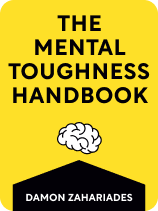

This article is an excerpt from the Shortform book guide to "The Mental Toughness Handbook" by Damon Zahariades. Shortform has the world's best summaries and analyses of books you should be reading.
Like this article? Sign up for a free trial here.
Looking for an overview of The Mental Toughness Handbook by Damon Zahariades? What are his strategies for developing mental toughness?
In The Mental Toughness Handbook, Damon Zahariades teaches readers about the benefits of mental toughness, providing a step-by-step guide to building mental fortitude and resilience. Mental toughness is a state of mind that you learn and earn through hard work, persistence, and patience.
Read on for an overview of The Mental Toughness Handbook by Damon Zahariades.
The Mental Toughness Handbook: Overview
In The Mental Toughness Handbook, Damon Zahariades provides a step-by-step guide to building mental fortitude and resilience so you can confront challenges and navigate adversity courageously. Mental toughness is a state of mind that you learn and earn through hard work, persistence, and patience. You build it by controlling negative emotions, cultivating your self-confidence, and reframing failures and setbacks as opportunities so you can bounce back from them better.
Damon Zahariades is a productivity expert and owner of ArtOfProductivity.com, where he explores time management strategies, reviews productivity apps, and teaches people how to create habits to get more done and enjoy their free time. He has authored other books on these topics, including The Time Management Solution and The Art of Letting Go.
What Is Mental Toughness?
In The Mental Toughness Handbook, Zahariades defines mental toughness as strength and fortitude in the face of stress and obstacles. Mental toughness centers on your ability to effectively manage negative emotions like anger, fear, and sadness so they don’t control and lead you to make bad decisions. It also reflects your persistence and resilience in moments of hardship. Mental toughness isn’t something you’re born with, but a state of mind you can cultivate with patience, passion, and hard work.
The Benefits of Mental Toughness
You can see the perks of mental toughness in the behavior of people who are mentally strong. Like them, when you become mentally tough, you’ll be able to:
1) Act rationally and confidently under duress. Mentally tough people are attuned to and resist negative emotions like anger, fear, sadness, and anxiety, as well as negative self-talk.
2) Maintain a clear focus. Mentally tough people know the underlying reasons they’re pursuing their goals, and they don’t allow their need for immediate gratification or their emotional pain to derail them. When you cave to your impulses or let past mistakes and grievances haunt you, you don’t have time or energy to stay focused on what you’re trying to achieve.
3) Have a positive yet realistic mindset. This mindset enables mentally tough people to function at their highest level. It’s rooted in the fact that they accept that: a) the world is unpredictable, b) obstacles, setbacks, and change are a natural part of life, and c) the way to make progress is by confronting these realities head on.
4) Be resilient in the face of setbacks and failure. Mentally tough people recognize that disappointment, mistakes, and failure are natural parts of life, seeing them as opportunities to learn and grow.
Cultivate Mental Toughness
Now that we’ve mental toughness and the benefits it will bring to your life, we’ll look at six strategies in The Mental Toughness Handbook that Zahariades recommends to become mentally tough.
Strategy 1: Control Your Negative Emotions
Zahariades says you have to embrace, understand, and manage negative emotions to perform at your peak. As we discussed earlier, emotions like anger and fear can derail you by leading you to make poor decisions or fail to take action.
(Shortform note: In The Subtle Art of Not Giving a F*ck, Mark Manson offers a rationale for why managing difficult feelings may help you perform at your best: Emotions are feedback tools that point you toward useful change. Negative emotions signal that you need to take action, while positive emotions signal that you’re on the right track. For example, if you feel sad that you’re alone, that’s a cue that you need company. If you feel happy that you washed all the dishes and straightened up your home and can now enjoy your calm space—that will encourage you to continue to keep your surroundings neat and tidy.)
To do this: Practice controlling your negative emotions regularly:
- Rationally analyze anger, fear, and sadness as soon as they arise.
- Meditate for five minutes each day.
- Practice gratitude. Take a few minutes each morning, afternoon, and evening to reflect on things in your life that you appreciate, that have gone well, and that you can celebrate.
Strategy 2: Build Your Confidence
In The Mental Toughness Handbook, Zahariades says that to be mentally tough, you have to be confident in your ability to navigate difficult situations. You can increase your confidence by challenging negative self-talk.
To do this: Be on the lookout for attacks from your inner critic. When they arise, address them immediately by showing yourself the same kindness you’d show a close friend who’s feeling down.
For example, if your inner critic says: “You can’t do anything right!” counter that negative message with: “That’s not true. Today I fed and walked my dog, worked so I can pay my bills, and called my grandmother to say ‘hi’, which made her feel special.” Being compassionate toward yourself will make you feel more confident, which will help you deal with difficult situations more effectively and increase your willingness to take risks, fortifying your mental toughness.
Strategy 3: Confront Challenges Courageously
Zahariades argues in The Mental Toughness Handbook that to be mentally tough, you have to demonstrate courage in the face of adversity even when the outlook is poor. When you identify and address challenges proactively and with an action-oriented mindset, you offset feelings of paralysis and prepare yourself to respond to the obstacles you face productively and with confidence.
To do this: Accept the situation directly and refuse to let it overwhelm you. Zahariades acknowledges that this can be a tall order if, for example, you’ve been diagnosed with a life-threatening illness or lost a loved one. But, he says, when you’re able to regain control over your mind, you’ll be better prepared to address the problem.
Strategy 4: Reframe Failure and Obstacles As Opportunities
Zahariades says that when you change your perception of failure, you won’t feel like a victim of difficult situations. To be mentally tough, view failure as an inevitable part of life and valuable feedback that you can learn from—rather than something that’s bad or a reflection of your poor character or inadequacies.
To do this: When you make a mistake or fail, immediately acknowledge and dispute any negative thoughts that arise by telling yourself that this is a chance to learn and become better. Zahariades says this fosters a non-toxic headspace that will allow you to engage in the situation with a positive, creative mindset. Engaging in this process repeatedly will make it habitual.
Strategy 5: Develop Long-Lasting Habits
According to The Mental Toughness Handbook, developing habits bolsters mental toughness by giving you a consistent, stable practice to turn to in difficult times. Habits aren’t just a thing you do, they’re a reflection of your values and priorities. For example, if you run every day, you likely care about your health and, maybe, the time and mental space that running gives you to think and clear your head. Because habits are rooted in things you care about, they serve as an anchor in a way that willpower, motivation, and inspiration—which can come and go—do not.
(Shortform note: In High Performance Habits, Brendon Burchard says that high performers consistently engage in six common habits that support their other goals. Two key habits are: (1) improving your health, which builds energy, focus, and contentment, and requires that you regularly eat healthy foods, work out, and get enough sleep; and (2) developing a network of people who support you by being generous and helping others in order to earn their trust and respect.)
Zahariades recommends that you practice building several mental habits to increase your mental toughness, including self-restraint, focusing exclusively on situations you can impact or control (and ignoring those you can’t), and committing to embracing change.
- Self-Restraint: Zahariades says that learning to resist your immediate impulses—whether that’s eating a piece of cake or telling someone you went on one date with that you love them—teaches you to tolerate discomfort. Training your mind to live without the thing you crave at any given moment improves your cognitive resilience and ability to ignore distractions, bolstering your mental toughness.
- Focus Only on Situations You Can Impact: Zahariades says it’s a waste of time and energy to focus on things beyond your control, so it’s important to recognize what you can and can’t change and focus only on the former. This frees your mind to focus your attention where it’s most valuable.
- Commit to Embracing Change: When you consistently seek out and commit to change, Zahariades says you normalize the process of stepping outside your comfort zone and into the unknown. Welcoming this practice as an opportunity to take control of your life rather than waiting passively for change to happen builds and reinforces your confidence and ability to do it more often.
Strategy 6: Embrace Boredom
According to The Mental Toughness Handbook, boredom is a natural part of the process of mastering anything, including mental toughness, so you have to welcome it in your life. Zahariades argues that practicing any skill over prolonged periods of time—whether throwing a baseball or practicing the oboe—comes with moments of tedium, so it’s important to view boredom as an opportunity, not something you dread.
To do this he recommends acknowledging boredom when you feel it, practicing meditation, and reminding yourself of your bigger goal.

———End of Preview———
Like what you just read? Read the rest of the world's best book summary and analysis of Damon Zahariades's "The Mental Toughness Handbook" at Shortform.
Here's what you'll find in our full The Mental Toughness Handbook summary:
- A step-by-step guide to building mental fortitude and resilience
- How to reframe failures and setbacks as opportunities
- How to develop long-lasting habits to increase your mental toughness






